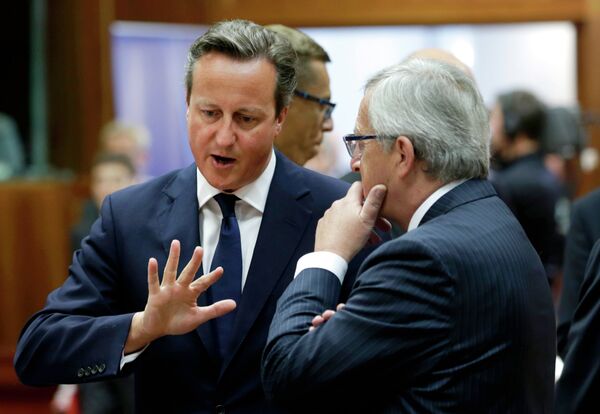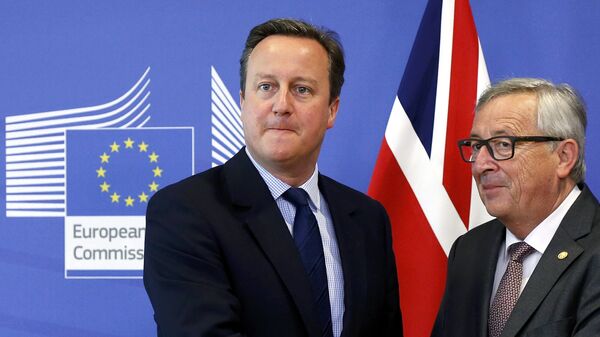The European Council is meeting Wednesday (June 29) for the first time in 41 years without a British prime minister at the table.
Watch the highlights of the June #EUCO. More information on the outcome: https://t.co/lmCTdKI3sl #EURef #Brexithttps://t.co/21xU7cI5WW
— EU Council (@EUCouncil) 28 June 2016
Cameron left after midnight on day one, following a morbid leaders' dinner, after which he told reporters: "Of course, it's a sad night for me because I didn't want to be in this position. I wanted Britain to stay in a reformed European Union. At the end of the day, I'm a democrat. I fought very hard for what I believed in. I threw myself in — head heart and soul — to keep Britain in the European Union and I didn't succeed."
Working dinner with @David_Cameron on the outcome of the #EUreferendum in the #UK just started! #EURef
— EU Council Press (@EUCouncilPress) June 28, 2016
Cameron had fought hard with Juncker to win concessions for the UK, ahead of the referendum, and had reached agreement to limit benefits to non-UK workers, cut red tape and prevent the UK from "ever closer union." In the aftermath of Brexit, the foreign ministers of the Czech Republic and of Poland demanded Jean-Claude Juncker's resignation, claiming that the EU institutions should take "responsibility" for last week's vote by British citizens to leave the EU.
The referendum triggered by UKIP has taken us out of the EU, caused the resignation of the PM, + Corbyn and Juncker? https://t.co/OpOb6czmpj
— UKIP Suffolk (@ukipsuffolk) 26 June 2016
Not the Best of Friends
Juncker and Cameron did not get off to a good start from the outset. Cameron opposed Juncker's appointment as Commission president in 2014, because he believed the former Luxembourg prime minister was too centralist, too European and would push an agenda that took powers away from nation states.

In the end, Cameron's comments, in June 2015, were prescient.
"I will tell you why it is so important. The European elections showed that there is huge disquiet about the way the EU works and yet the response, I believe, is going to be wrong on two grounds. Wrong on the grounds of principle: it is not right for the elected heads of government of the European countries to give up their right to nominate the head of the European Commission — the most important role in Europe. That is a bad principle."
"And it is the wrong person. Jean-Claude Juncker has been at the heart of the project to increase the power of Brussels and reduce the power of nation states for his entire working life. He is not the right person to take this organization forward. So, I am very clear about the right thing to do."
In the end, Cameron failed to convince the British public that staying in the European Union was the right things to do — precipitating Brexit and a war of words over who takes the blame. The majority of the British public railed against the Brussels machine which Juncker so loved.
Inevitably, Juncker, pinned the blame on Cameron, saying:
"My impression is that if you over years, if not decades, tell citizens that something is wrong with the EU, that the EU is too technocratic, too bureaucratic, you cannot be taken by surprise if voters believe you."
Juncker told the European Parliament that the Brussels machine will keep rolling, despite Brexit. "Our project goes on, and although the British vote may have slowed us down a little, we must continue our course towards the objectives we share with renewed ambition."
With Cameron — the man who opposed his nomination — out of the door, following the last supper, Juncker is basking in glory. But he has little grounds for complacency.


